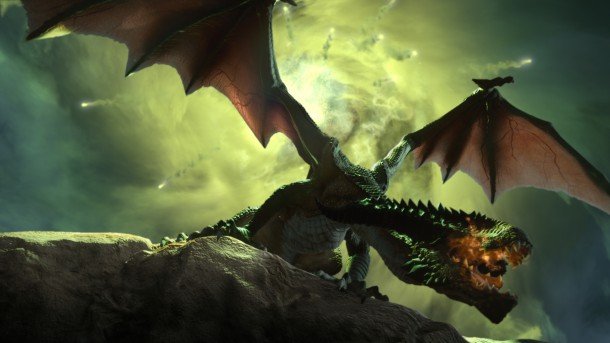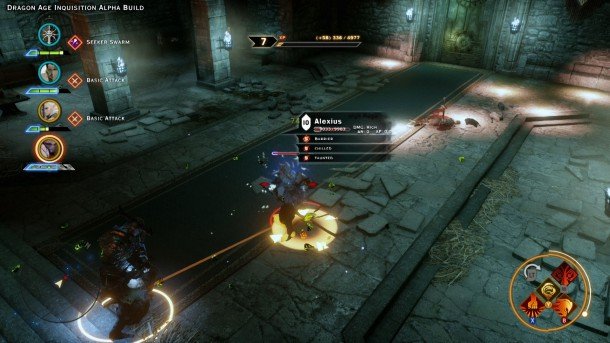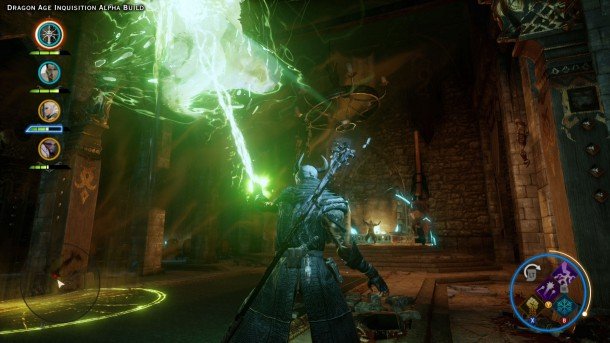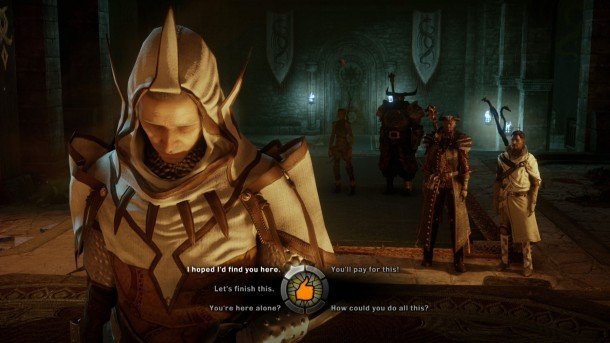Dragon Age: Inquisition hands-on: fighting dragons in BioWare's biggest RPG ever

My Dragon Age: Inquisition demo was supposed to last 30 minutes, but it was clear after five that we would go way over. Just standing at the edge of its world, its scope and depth immediately started to suck me in, making time disappear in that way that makes immersive, sprawling RPGs so enjoyable and dangerous to productivity.
I started in a forest area called The Highlands, one of about ten in the game bigger than the entirety of Dragon Age: Origins. I was supposed to use my time to explore, and with guidance from BioWare Producer Cameron Lee, hit a few key locations and events, but I kept straying from the critical story path.
Even with much content still missing from the demo, The Highlands were densely packed with details and interesting landmarks in the distance I wanted to see up close. I wandered into the ruins of a castle, killed a few enemies, and found some chests as I was exploring an environment I was genuinely interested in, not because of a conscious decision to step off the story's yellow brick road and grind for loot or experience.
It's easy to get lost in Inquisition because of how beautiful it is. The sun coming through the trees, mythical critters (which you can hunt and skin for the game's crafting system) frolic through pastures, a little cave with creepy wood sculptures straight out of True Detective—It's easily the prettiest game BioWare has ever made. It's the developer's first to use the Frostbite 3 engine (the same used in Battlefield 4), and the team is making it sing.

Frostbite lets BioWare create huge beautiful environments, but Lee told me one of the biggest challenges for the team is filling them with meaningful content. So far it seems that it's rising to the challenge. Nothing looked copy/pasted, or efficiently generated with tile sets. Every environment looks like it's handcrafted.
When I finally wandered into some Templars off the main road, I was also pleasantly surprised by how streamlined combat was without sacrificing its more complex heritage. It was straight forward and action-oriented, more tactical, or balanced between both depending on how I wanted to play. Lee said that the game won't be a cakewalk even on the easiest difficulty, but that harder difficulties are better if I wanted to dig into the more complicated aspects of combat, setting up behaviors for party members depending on what enemies we face, with what stats, etc.
Switching between my main character, a Qunari mage, and human archer, using their different abilities, and taking advantage of the pause and isometric view features were so intuitive that by the time I was done with the demo I felt like I knew what I was doing. I cast Haste with my mage, creating a bullet time-type effect. Then I spam freezing bolts and quickly switch to my brute melee character, who shatters the frozen enemies with his axe. It wasn't just good tactics, it felt and looked badass.
Keep up to date with the most important stories and the best deals, as picked by the PC Gamer team.
By cutting the clutter of menus, numbers, and other distractions, Inquistion leaves me to the fun, important choices: what character I want to use for what purpose, with what ability, and where?

Later in the demo, while exploring a dilapidated Redcliff Castle from Origins, I demolished a group of mages by placing my archer at the top of a staircase, using my heavy melee character to block the path and tank at the bottom, and my main character to cast area of effect spells on the crowd below. It made combat feel like it happened in a real place, as opposed to other RPGs where every encounter can feel like an abstract tabulation of character stats.
For a game with a “dragon” in the title, battles against those creatures need to be a spectacle. Thankfully, the one I fought was promising. As I approached the dragon down a valley, he flew above and bombed me with giant fireballs that sent debris flying, and streams of fire that were some of the best effects of that type I've seen. I spent most of the battle dodging his attacks and firing spells and arrows at him in real-time without overthinking it, and paused the action occasionally to take advantage of Inquisition's new ability target specific body parts in order to hobble his rear legs, for example.
No demo would give us a thorough understanding of Inquisition's story, but I'm intrigued by what I saw of its approach to storytelling. In addition to its colorful mythology, diverse cast of characters, and the dialogue options that are staples of BioWare RPGs, Lee told me that my decisions will have a physical effect on the world. He said I'll be able to build bridges that lead to new areas, drain massive lakes to reveal dungeons and destroy the fragile economy of a nearby fishing village, and other radical impacts I could have on the landscape and population.

I didn't see any of that myself, but I did see how the Inquisition I led was itself a kind of character. As I progressed through the demo, I claimed ground for the Inquisition and set up camps where I could craft, change party members, and do other maintenance. Once I did, the Inquisition forces followed. Soldiers showed up in the camp and the roads leading to it, and their appearance will change depending on my choices. It made it feel like I was not just a hero with a few fellow adventurers, but a part of grand army that is moving through and changing the world. You can also upgrade the Inquisition along military, political, or espionage strategies, each with its own gameplay benefits, so it's not just for show.
That's what impressed me most about Dragon Age: Inquisition. It's a huge game—in scope, in size, and in budget, I'd bet. It looks like BioWare finally got the time and means to make the game that matched its ambitions, and none of it is being used frivolously. Every nifty visual effect and combat mechanic is in service of a greater vision, and based on what I played, it's all coming together nicely. Now that I've played it, Inquisition is one of my most anticipated games of the year.

